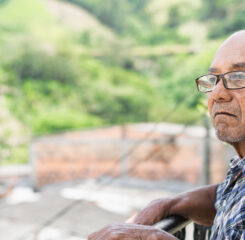Senate HUD Funding Bill Expands Service Coordinators, RAD Funding
On July 28, the Senate Committee on Appropriations issued all of its 12 appropriations bills, including the Transportation-HUD bill, via press release. These are partisan bills that have not been negotiated with Senate Republicans. The House passed its FY23 HUD appropriations bill on a party-line vote on July 20. Despite the damage imposed on housing programs by delayed funding bills, the final HUD bill is not expected to be enacted before the October 1 start of fiscal year 2023.
Expanding the Supply of Affordable Housing
The Senate’s bill would provide increases to HUD’s HOME program, which provides flexible block grants to state and local government for rental and homeownership housing. To combat “state and local zoning and land use laws and regulations that limit the number of units that can be built and impose burdens on development,” which the bill calls a “significant contributor to the lack of housing supply and production,” the bill would also fund, via a set-aside in the Community Development Block Grant program, a new Yes In My Backyard Incentive Grant Program to reward State, local, and regional jurisdictions that have made progress in improving exclusionary zoning practices, land use policies, and housing infrastructure that will ultimately increase the supply of affordable housing.
For HUD’s Section 202 Supportive Housing for the Elderly program, the bill would provide $132 million to construct and operate new Section 202 homes, compared with $323 million for new Section 202 homes in the House-passed FY23 bill.
Additionally, the bill would provide funding to expand the number of vouchers by 50,000 and urges HUD to relax constraints on project-basing vouchers for “affordable housing projects that serve special populations, including people experiencing homelessness and individuals discharged from hospitals and other facilities” to provide “affordable housing to special needs populations who would otherwise face barriers in finding suitable housing in the private rental market.”
Contract Renewals
In addition to fully funding Section 8 Project-Based Rental Assistance and Section 202 Project-Rental Assistance Contract renewals, the bill would provide $53 million to provide budget-based rent adjustments to PBRA contracts that have been renewed through the Mark-to-Market (M2M) program and are distressed or at risk of becoming distressed. When using this funding, the bill would require HUD to prioritize properties that meet all of the following conditions: rents below 80% of fair market rent; REAC scores below 70; and designated as troubled or potentially troubled.
“The Committee recognizes there are additional post-M2M properties that may require budget-based rent adjustments and directs HUD to use existing data sources, including PBCA/HUD management and occupancy reviews, as well as REAC inspections, to assess the physical property and operational needs amongst post-M2M properties and other PBRA properties with health and safety deficiencies to better understand the scope of the problem. HUD is directed to provide the results of this assessment to the House and Senate Committees on Appropriations within 180 days of enactment of this act,” the report accompanying the bill says.
Service Coordinators
The bill would fully fund Service Coordinator grants and provide $25 million for new Service Coordinator grants. The Committee’s bill also urges HUD to “prioritize grant awards to applicants located in States with older populations (in accordance with median age) that have established and evaluated models of support and service at home.”
Rental Assistance Demonstration
The bill would provide $10 million to increase Section 202 Project-Rental Assistance Contracts rents converting to the Section 8 platform under the Rental Assistance Demonstration. This is $4 million above the House-passed bill’s funding, and matches what HUD requested for FY23.
The bill would also expand RAD to include Senior Preservation Rental Assistance Contracts and Section 811 Housing for Persons with Disabilities communities.
Aging-in-place Home Modification Grants
Congress first authorized aging-in-place home modernization grants in its FY17 appropriations bill as a set-aside in the Section 202 account. The program is now run through HUD’s Office of Healthy Homes. Since the program’s start, appropriators have been adamant these funds only be used to help older adult homeowners modify their homes. LeadingAge has pushed back strongly on the funding’s exclusive use for homeowners; 22% of the nation’s older adults rent their homes and this share is only projected to increase. The July 28 Senate appropriations bill, which has yet to be negotiated with Republicans, shifts eligible recipients beyond just homeowners to “low income seniors living in homes that are not receiving project-based rental assistance.” LeadingAge is very pleased with this shift.
Buy America Requirements
In the report accompanying the Senate’s FY23 HUD funding bill, the Appropriations Committee “urges the Department to fully and swiftly comply with the Buy America requirements. “Currently, HUD programs are operating under a temporary waiver, posted by HUD on April 29, from the new Buy America Preference requirement. The waiver is set to expire on November 15, 2022, and all infrastructure funds awarded after that date will be subject to the new requirement, pending any further general or specific waivers from HUD. In July 2022, responding to a request from HUD for comments on the new requirements, LeadingAge urged HUD to exempt affordable housing from the “Buy America” requirement.
Reforming Disaster Recovery Act
The Committee’s bill includes the Reforming Disaster Recovery Act, V which will accelerate assistance to disaster-impacted communities by creating a Long-Term Disaster Recovery Fund to make funding more predictable; permanently authorizing CDBG-DR, which will allow HUD to issue regulations in a way that supports resilience, reduces administrative burden, and reduces conflicts between Federal agency requirements; and quickly supporting grantee capacity following major disasters. Due to the lack of predictable funding and program regulations, implementation of CDBG-DR funds is uneven and slow, taking anywhere from 8 months to multiple years to reach impacted households.
Read LeadingAge’s FY23 HUD funding priorities.
Read more about the House-passed FY23 funding bill.

Most Recommended
October 15, 2025
 Shutdown Week Three: Impact of Ongoing Closure on Affordable Housing
Shutdown Week Three: Impact of Ongoing Closure on Affordable Housing
February 24, 2026
Fiscal Year (FY) Funding 2026
October 07, 2025
Immigrant Workforce Matching Program Brings Workforce Relief
Recently Added
March 04, 2026
 Colleagues on the Move, March 4, 2026
Colleagues on the Move, March 4, 2026
March 03, 2026
DOL Proposes New Worker Classification Rule
March 03, 2026



